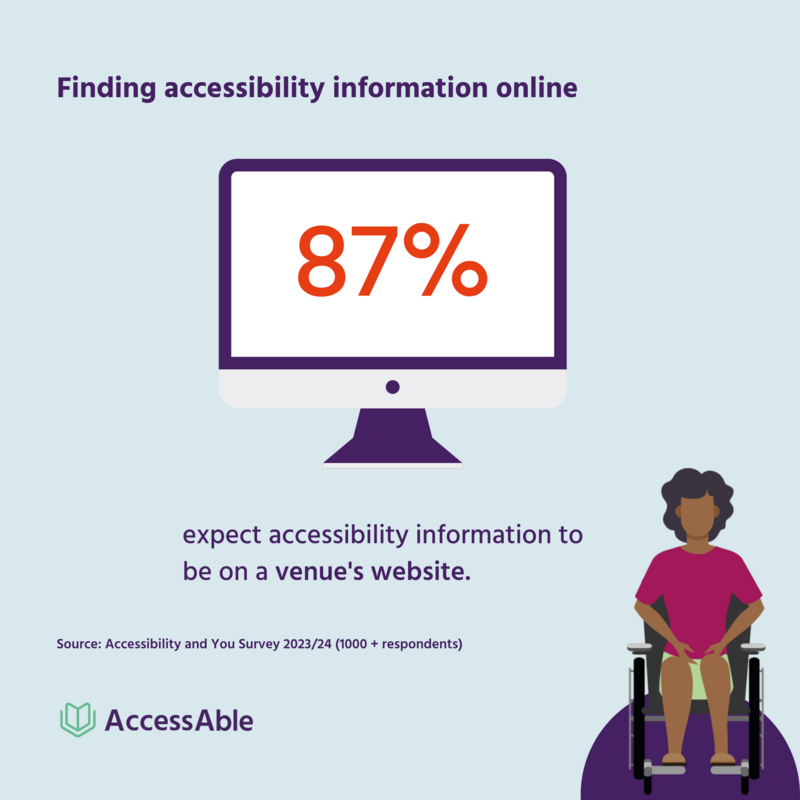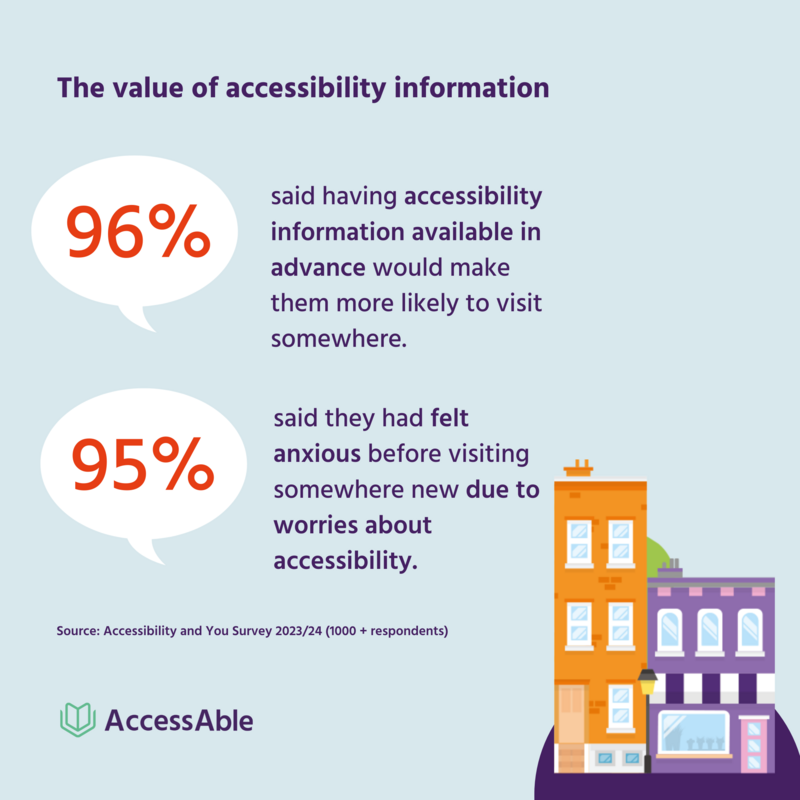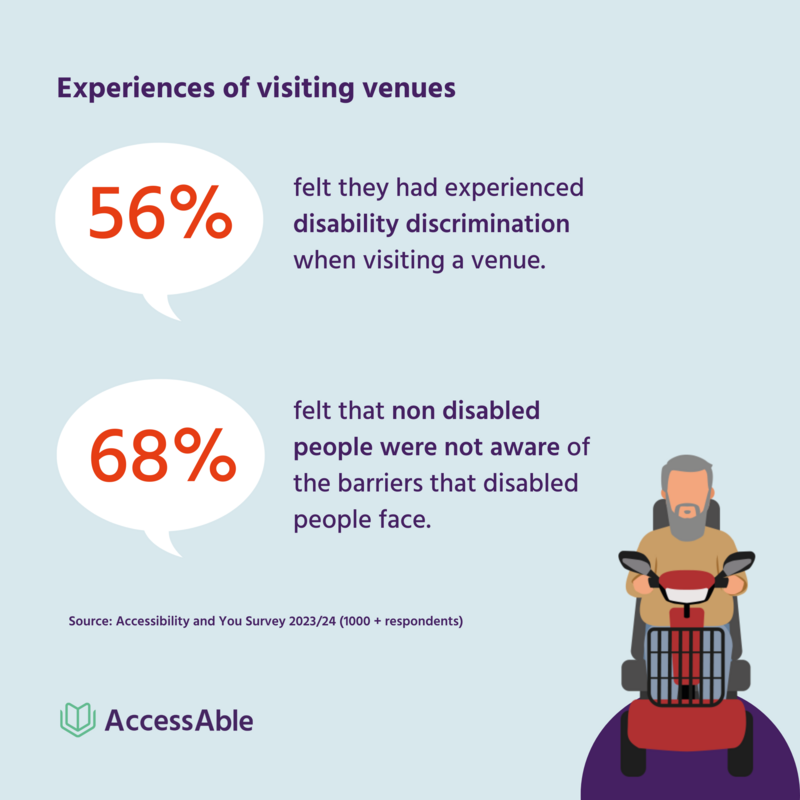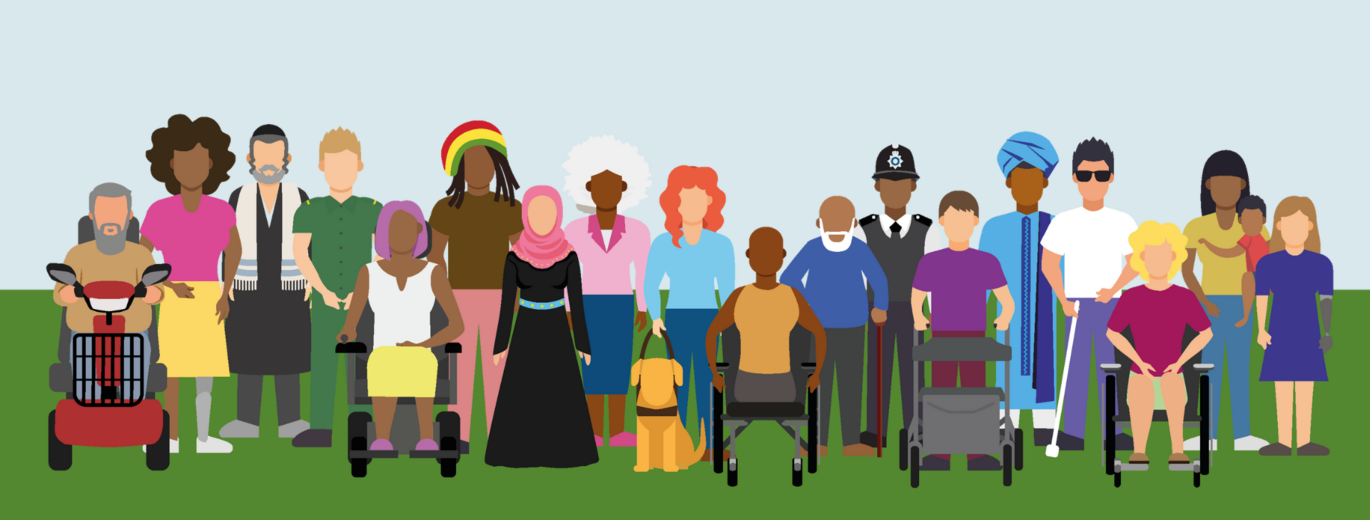New AccessAble Survey highlights crucial insights on accessibility challenges and the need for action
At the end of 2023, we launched the Accessibility and You Survey to gather insights into the accessibility requirements and experiences of disabled people.
Open to the public until mid-2024, the survey received 1,000 + responses, with participants answering multiple-choice questions and sharing open-ended feedback. A diverse set of voices contributed to the survey, with 81% of participants identifying as disabled people and the remaining 19% comprising carers, family members, and professionals from the NHS, care, and disability sectors.
Our 2018 survey highlighted numerous barriers - physical, attitudinal, and policy-based - that prevented disabled people from fully participating in society. Building on this foundation, we anticipate that the insights gained from the 2023-2024 survey will offer further evidence to drive positive change.
Thank you to everyone for participating in our survey and sharing your experiences. Here is a breakdown of the key findings and insights from the survey.
Finding and researching accessibility information
One of the most revealing findings from the survey is that 95% of respondents check accessibility information before visiting a new place. This highlights just how critical it is for disabled people to know in advance if a venue is accessible to them. Planning ahead to visit new places is a common practice, with the typical time spent researching accessibility information before visiting a venue ranging from 20 minutes to 1 hour.
90% of participants said it was either important or extremely important to have this information available before their visit. Notably, 96% of participants said that having accessibility information available in advance would make them more likely to visit a venue.
This highlights the urgent need for businesses to prioritise clear and accessible details on their websites and communications.

Searching online for accessibility information
A venue’s website is seen as a key source of accessibility information, with 87% of respondents expecting the website to signpost detailed access information and photos. However, survey responses show that accessibility details are often scattered across different sections of venue websites, leading to varying expectations.
Many respondents believe that this information should be clearly located on the Homepage, Visit Us, About Us, or FAQ pages. Additionally, a significant number of participants suggested that venues should have a dedicated Accessibility or Access tab for easier navigation. Overall, the consistency and visibility of accessibility information can vary widely across sites.

The impact of poor accessibility information
95% of respondents said they feel anxious about visiting new places due to accessibility concerns. 77% reported avoiding venues because they couldn't find accessible information, and 73% said they had to leave a venue because it was not accessible. The most common reason was that promised accessibility features were not actually available.This highlights a significant barrier to participation, as people are forced to make assumptions and sometimes avoid venues entirely.

Inadequate facilities and poor staff attitudes
44% of respondents reported having to leave a venue because of poor or unhelpful staff attitudes, further indicating the need for better staff training and awareness. Additionally, 56% of participants said they had experienced disability discrimination at venues, highlighting the importance of creating respectful, inclusive environments for all visitors. Discrimination may not always be overt, but the subtle barriers that exist - ranging from unhelpful staff to inaccessible physical spaces - create an environment that is exclusionary.
The survey found that 68% of respondents rated staff awareness of accessibility issues as “average,” “poor,” or “extremely poor,” pointing to a significant gap in staff training. This indicates the need for organisations to invest in training to ensure disabled visitors have a positive experience and their needs are met.

Has accessibility improved in the last five years?
While 44% of respondents felt accessibility had improved in the past five years, 47% felt it had stayed the same, and 9% felt it had worsened. This indicates that while progress has been made, significant work remains to be done to ensure that accessibility continues to evolve and improve in line with the needs of the disabled community.
Raising awareness among non-disabled people
68% of respondents felt that non-disabled people are unaware of the barriers faced by disabled people. This emphasises the importance of raising awareness and fostering empathy to ensure broader public support for accessibility initiatives.
What next?
Dr. Gregory Burke, Founder and Executive Chair of AccessAble said:
"The results of our survey clearly highlight the urgent need for businesses, organisations, and venues to prioritise accessibility. We want to see these findings driving tangible improvements, ensuring that accessibility is at the forefront of planning, operations, customer and colleague experience. By removing barriers to participation and creating inclusive environments, we enable everyone to access services and have a positive experience. Providing accessible services is not only a moral imperative but also a strategic advantage. It can lead to enhanced business outcomes by reaching a larger market, mitigating legal risks, and building stronger customer loyalty.
“AccessAble is here to provide support no matter where an organisation is on its accessibility journey.”
How we can help
Detailed Access Guides
Developed continually with end users, Detailed Access Guides are created through a surveyor assessment, using a unique research tool. They contain 100s of data points and photographs, providing a comprehensive, factual account of what somewhere will be like. Each Guide is published on www.AccessAble.co.uk and can be easily integrated into an organisation’s own website.
To recommend our Detailed Access Guides to your favourite places and spaces, you can order recommendation cards here.
Inclusive Design Consultancy
AccessAble can provide a wide range of inclusive design support. We have a team with decades of experience who hold NRAC accreditation. Support ranges from design reviews and access audits to development of policy and organisational best practice.
eLearning
AccessAble’s eLearning uniquely combines legal expertise with the lived experience of disabled people. AccessAble has been providing eLearning for over a decade. To date our online courses have been completed by over 75,000 people. Our new eLearning is available on our own LMS or as a SCORM file.
If you would like to know more about working with us please visit www.AccessAbleConsultancy.co.uk
To read the Accessibility and You Survey in full, please click here to download the pdf.
About AccessAble
AccessAble was founded almost 25 years ago by disabled entrepreneur Dr. Gregory Burke.
Our mission is to collaboratively support organisations to see the value of change and bring a positive impact to the lives of disabled people and wider society.
The 10,000s of Detailed Access Guides we produce, available to use for free at www.AccessAble.co.uk, are trusted by over 6 million disabled people every year.
AccessAble works with 475 + partners, including household names such as Marks and Spencer, National Trust and TUI, 80 + local authorities, 100 + universities and 95 + NHS trusts. We create Detailed Access Guides to their places and spaces while also supporting them to provide inclusive experiences.
In 2024, AccessAble launched the Your Accessibility Guide Portal, supported by VisitEngland and VisitScotland, to further engage SMEs and tourism businesses.
Grounded in its grassroots beginnings, coproduction is at the heart of AccessAble, 1000s of disabled people have shaped our service and continue to do so.

